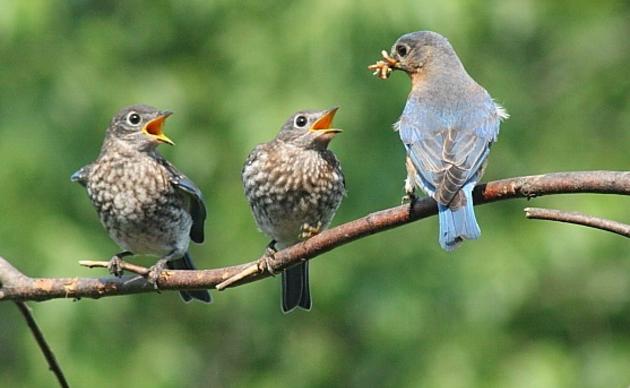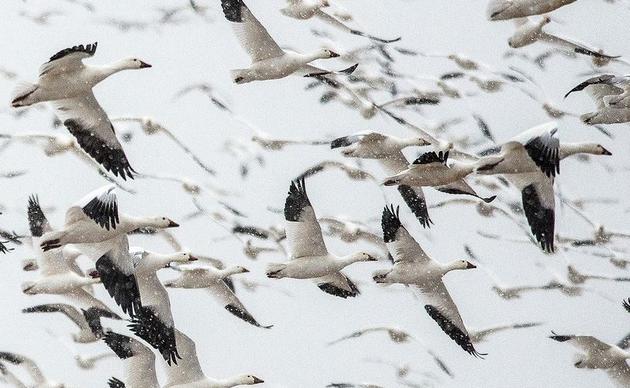Albany, NY (January 18, 2022) - Today, Governor Kathy Hochul proposed historic reforms to the Department of Environmental Conservation's ("DEC") Freshwater Wetlands Regulatory Program in the SFY 2022-23 Executive Budget. If enacted, this proposal would expand the State's protections to over 1,000,000 additional acres of freshwater wetlands. New Yorkers rely on swamps, fens, bogs, and wet meadows to filter pollutants from our waterways, recharge our aquifers, protect endangered and threatened species, and absorb climate change-induced floods. Yet New York State's outdated wetlands laws and regulations have allowed the filling, dredging, and draining of wetlands at an alarming rate. Governor Hochul's Executive Budget proposal would ensure that the DEC can use 21st century tools to identify and protect wetlands that provide big benefits to communities across the state.
“Wetlands are critical for bird health and population stability - including threatened or endangered species like the Pied-billed Grebe, Black Rail, and Short-eared Owl. Protecting these birds' habitat is essential to their future survival and has the added benefit of providing important ecosystem services to New Yorkers across the state,” said Erin McGrath, Policy Manager for Audubon New York. “We applaud Governor Hochul for including this important proposal in her Executive Budget proposal and helping to ensure that the State finally has the ability to protect these important wetlands. We now ask the Assembly and Senate to lend their support to this historic legislation and ensure it is enacted into law. ”
The current crisis for New York State's wetlands stems from decades of regressive court decisions, federal rollbacks, insufficient DEC staffing, and political pressure to weaken state regulations. One of the key features of the Executive Budget proposal is that it overhauls how wetlands are mapped and recognized by New York State. Currently, a wetland must be delineated on jurisdictional maps prepared by DEC in order to be subject to regulation under New York State law. However, most of these maps have not been updated in over 20 years, making them functionally inaccurate, and the amendment process can be time-consuming and overly burdened with administrative costs. This means that hundreds of thousands of acres of wetlands in high development areas of New York State are not on official maps despite meeting protection criteria.
The Executive Budget proposal will remove the jurisdictional barriers that these maps have created and allow the DEC to immediately protect and regulate wetlands if they meet the basic scientific definition of these critical habitat areas. These reforms, which closely track with legislation that passed the Senate last year, will preserve the DEC's authority over wetlands 12.4 acres and larger and expand the DEC's authority over smaller wetlands of 'unusual importance' that provide floodwater control, maintain clean drinking water, provide habitat for vulnerable plants or wildlife, or are in urban areas.
This new budget proposal awaits the support of the Senate and Assembly, and we urge Leader Stewart-Cousins and Speaker Heastie to prioritize these important wetlands reforms in the final budget negotiations.
Roger Downs, the Sierra Club Atlantic Chapter's Conservation Director, said, "The Save NYS Wetlands Coalition applauds Governor Hochul for bringing us one step closer to protecting an additional one million acres of New York's freshwater wetlands. The critical reforms proposed in her Executive Budget will lead to better protection of New York's wetlands from unnecessary pollution and destruction, and ensure that they can continue to provide New Yorkers with important ecosystem services. Protecting our wetlands is a smart investment that provides many dividends, including protecting our drinking water, mitigating the impacts of flooding, enhancing climate resiliency, and supporting vulnerable ecosystems and the wildlife that depends on them. Governor Hochul's commitment to protecting wetlands demonstrates a kind of environmental leadership we have not seen for decades, and we thank her for taking these bold steps. We call on the Assembly and Senate to include these reforms in their budget proposals and enact these critical protections into law."
Buffalo Niagara Waterkeeper applauds Governor Hochul's proposed historic reforms to the Department of Environmental Conservation's Freshwater Wetlands Regulatory Program in the 2022-23 Executive Budget. Protecting over 1,000,000 additional acres of wetlands in the State will help ensure climate resiliency for our Great Lakes shorelines and ecosystems in New York, while protecting water quality for our globally significant freshwater resources. We urge the State Senate and Assembly to adopt this proposal in recognition of New York’s important position as a Great Lakes State,” said Jill Jedlicka, Executive Director, Buffalo Niagara Waterkeeper.
“New York has lost 60% of its historical wetlands to human development and activity. The loss of these valuable ecosystems impacts the daily lives of residents who need clean water and flood protection, as well as waterfowl and wildlife who rely on these diverse landscapes for their lifecycles,” said Ed Farley, Ducks Unlimited regional biologist for New York. “Ducks Unlimited applauds Gov. Hochul’s plan to protect an additional 1 million acres of wetlands. Keeping what we still have is a gift to future generations of New Yorkers, who will have greater opportunities to use these environments for outdoor recreation.”
Rob Hayes, Director of Clean Water for Environmental Advocates NY said, “Wetlands are a critical component to vibrant, sustainable ecosystems and are vital to a healthy environment. They deserve our full attention through proper legislation and smart investments. Governor Hochul's proposal to strengthen safeguards for wetlands and increase funding for the Environmental Protection Fund will ensure these crucial and irreplaceable habitats are protected for generations to come."
“Healthy wetlands are essential for protecting our communities from the impacts of climate change and filtering drinking water supplies. Despite the immense value of our wetlands, they have been in peril for decades due to inadequate policies,” said Brian Smith, Associate Executive Director at Citizens Campaign for the Environment (CCE). “Today, Governor Hochul has taken a monumental step forward in ensuring that critical wetlands are no longer polluted, bulldozed over or destroyed. We commend Governor Hochul for including reforms to the DEC’s Freshwater Wetlands Regulatory Program in the Executive Budget, and now urge the Senate and Assembly to include these wetlands reforms in the final SFY 2022-23 budget.”
"Wetlands provide natural beauty, support diverse wildlife, and offer recreational opportunities for New Yorkers and visitors. As a natural resource, they contribute to climate resilience by reducing flood risk, mitigating heat impacts, and storing carbon. As an organization that supports the care and management of natural areas, this legislation was a priority for us. We thank Governor Hochul for her leadership on this legislation," said Sarah Charlop-Powers, Executive Director of the Natural Areas Conservancy.
“The Nature Conservancy is thrilled Governor Hochul has proposed strengthening state regulations to protect freshwater wetlands. Across New York, wetlands act as a first line of defense against flooding by naturally keeping water away from homes, roads, and businesses. Healthy wetlands also clean water by trapping and filtering contaminants and provide unique habitat to wildlife. We look forward working with the Governor, State Legislature, and partners to help ensure our wetlands are better protected in this state budget,” said The Nature Conservancy’s Jessica Ottney Mahar, New York policy and strategy director.
Patrick McClellan, Policy Director of the New York League of Conservation Voters, said, "Governor Hochul is making wetlands preservation a key priority in the fight against climate change. By protecting an additional one million acres, we will see significant progress on many key areas: from improving resiliency and helping prevent flooding to filtering harmful pollutants from our waterways and sequestering carbon. This is an important and historic announcement, and we applaud the Governor for turning advocacy into action."
“Investing in natural, land-based solutions to protect New York’s significant natural resources and fight climate change and its effects is critical,” said Kim Elliman, president and CEO of the Open Space Institute. “By prioritizing the protection of New York’s vulnerable wetlands, Governor Hochul is taking a wise and necessary steps to maintaining water quality, fight climate change and mitigate the effects of severe storms and flooding. We look forward to working with the governor and the legislature to secure vital wetlands mapping changes this year.”
“Governor Hochul’s budget proposal to reform New York’s outdated freshwater wetlands program is a breath of fresh air for the environment. These reforms will protect wildlife, prevent flooding, and preserve clean water,” said Riverkeeper Senior Manager of Government Affairs, Jeremy Cherson. “Riverkeeper thanks Governor Hochul for her taking on this difficult problem. It’s been ignored for too long. We look forward to working with your administration to ensure wetlands in the Hudson River watershed are adequately protected.”
Scenic Hudson State Policy Coordinator Carli Fraccarolli said, “Our state’s wetlands provide critical habitat for fish and wildlife, and protect our communities. Without adequate identification and preservation, the many ecosystem benefits from wetlands, including shoreline conservation, flood reduction, and safeguarding water quality are at risk of being lost. Governor Hochul’s proposed reforms will help to stop the destruction and disappearance of wetlands in the Hudson Valley and make sure that these critical resources are properly protected by the state.”
The Save NYS Wetlands Coalition includes the Adirondack Council, Audubon New York, Buffalo Niagara Waterkeeper, Citizens Campaign for the Environment, Ducks Unlimited, Environmental Advocates of New York, Natural Areas Conservancy, The Nature Conservancy in New York, New York League of Conservation Voters, New York State Ornithological Association, Open Space Institute, Riverkeeper, Seatuck Environmental Association, Scenic Hudson, Sierra Club Atlantic Chapter, and the Waterfront Alliance.
For more information, visit https://save-nys-wetlands-audubon.hub.arcgis.com/.
Contact: Sharon Bruce, Communications Manager, sharon.bruce@audubon.org




